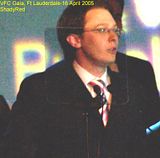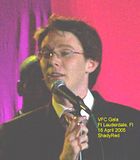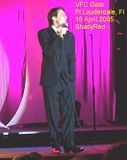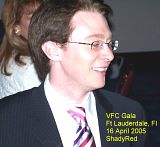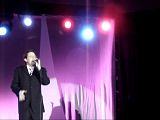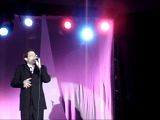ABC Dishes Dirt on Fox's 'American Idol'
By JACQUES STEINBERG
Published: May 4, 2005 - New York Times.com
n a rare example of one television network's turning an investigative spotlight on the entertainment programming of a rival, ABC News released excerpts last night from an interview with a former contestant on the Fox show "American Idol" who contends he received intensive coaching during the competition from one of the show's three judges, Paula Abdul.
The former contestant, Corey Clark, who made it as far as the top 12 during the 2002-3 season of "Idol," has also told ABC that he had a romantic relationship with Ms. Abdul while a contestant.
He was disqualified from the program on April 1, 2003; producers said he failed to disclose that he had once been arrested and accused of assaulting a younger sister. He later pleaded no contest to a lesser charge.
To buttress Mr. Clark's claims against Ms. Abdul, ABC said that when it broadcasts the interview - during a one-hour prime-time special this evening - it will play answering machine messages it says were left for Mr. Clark by Ms. Abdul and will document several dozen telephone calls between them.
Among Mr. Clark's assertions are that Ms. Abdul assisted him in picking out songs he might sing - in one instance, he tells ABC, she suggested a song that might go over well with a fellow judge, Randy Jackson - and helped select what he would wear.
A lawyer for Ms. Abdul, Martin Singer, did not immediately return a telephone call last night seeking comment on the excerpts from the ABC interview. The excerpts were released by the network just before 6 p.m. - two hours before an installment of "Idol" was broadcast, live, on Fox.
In a statement, Fox said that neither it nor the program's producers were "notified or contacted by Mr. Clark, nor presented any evidence concerning his claims."
"We will, of course, look into any evidence of improper conduct that we receive," the network added. It then recommended that "the public carefully examine Mr. Clark's motives." ABC said that during Mr. Clark's appearance on "Primetime Live" he would discuss a coming album that contains a song about his experience with Ms. Abdul.
"Idol" is one of the most watched - and thus, most lucrative - shows on television. Earlier this year, the worldwide "Idol" franchise was sold for more than $160 million to a company controlled by Robert Sillerman, a media entrepreneur. "Idol" drew a combined 50 million viewers during two prime-time installments last week, ranking it second and third for the week, according to Nielsen Media Research.
Mr. Clark's assertions represent a threat to the show because they undercut a fundamental reason for its appeal: the notion that it offers a fair, level playing field. While producers insist that it is viewers voting by telephone who choose the winners and losers, judges like Ms. Abdul can, at the least, help make the case (or not) for a particular contestant.
"In the case of 'American Idol,' we've done a lot of research in how the fan culture operates and what people find engaging about the experience," said Stacey Lynn Koerner, executive vice president of Initiative, a media planning and buying firm that has purchased advertising time on the program. "The thing that fans say transcends everything is the concept of the real and genuine contest. If that genuine essence is at issue, it could be problematic."
Mr. Clark's accusations - versions of them have appeared in recent weeks in The New York Post, The Globe tabloid and elsewhere - have surfaced at a critical time for the program. The thousands of singers competing this season have been winnowed to five, and the winner is to be selected on May 24 and 25.
During its four years, "Idol" seems to have thrived on controversy. Its ratings have only seemed to grow, whether a contestant was disqualified for baring her breasts on the Internet (also in the second season) or a contestant quit for "personal" reasons that have yet to be disclosed (Mario Vazquez, earlier this year). In March, the producers broadcast a program that was redone after a graphics error disrupted the voting for some contestants.
The producers of "Idol," 19 Entertainment and Fremantle Media, have used contracts to discourage former contestants from discussing their backstage experiences. But now that "Idol" is wrapping up its fourth season, many of the contracts from earlier years have expired.
In a telephone interview, another finalist from the second season, Julia DeMato, said that she had seen no sign of any overt favoritism shown by Ms. Abdul to Mr. Clark. But Ms. DeMato, who was voted off the show by viewers on March 26, 2003, said that the preference shown by the producers for certain contestants was more subtle.
She said, for example, that the eventual winner and runner-up during the second season - Ruben Studdard and Clay Aiken - received far more vocal coaching than she did and were given assistance with wardrobes and hairstyling that was not made available to her.
"It's very obvious behind the scenes who they gear their attention to," said Ms. DeMato, 26, who works as a singer and part-time hairstylist. "Certain people got more attention than others. Those people made it far. In that aspect, it wasn't equal."
"The stylist never styled me," she added. "Some people had custom-made outfits done. I never got that. It's not fair."Even before ABC released the excerpts from its interview with Mr. Clark, Ms. Abdul, a former pop singer, was the subject of increasingly critical chatter on the Web. "Idol" blogs have cited her on-screen playfulness with another judge, Simon Cowell, and her sometimes over-the-top endorsements of contestants.
In something of a rebuttal, Ms. Abdul, in a first-person article heralded on the May 2 cover of People magazine, described a two-decade battle with pain and with pain pills, which, she said, made her "loopy" - a battle, she said, she won only recently.
Those combing episodes of "Idol" to find her on-camera comments about Mr. Clark would find that she was effusive - though not especially more so than she has been about other contestants.
"You were on it, Corey," she told Mr. Clark on March 25, 2003, after he sang the song "Drift Away," during one of his last performances. "You're on it when you pick songs in that beautiful upper register. And you know what? It's really refreshing."
"You're on it tonight," she added. "And you're in good voice tonight."

















